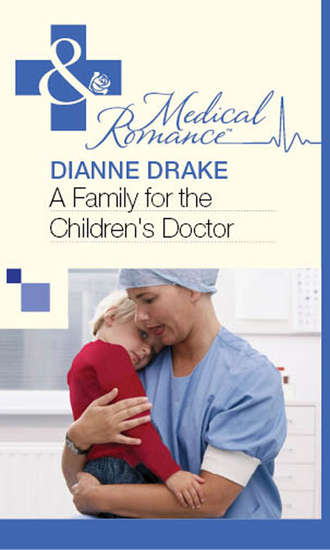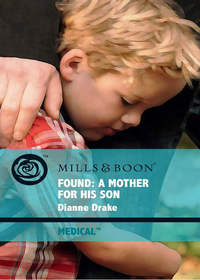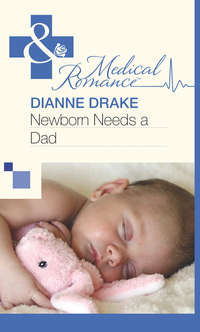
Полная версия
A Family for the Children's Doctor
“Look, Caprice, I don’t blame you for being angry, but I’ve made arrangements to stay.”
That stopped her. Dead in her tracks, actually. Taking a firmer grip on Isabella’s hand, she turned around slowly to face him. “So now you want to stay?” she snapped. “Quit one minute, come back the next?”
“I always wanted to stay,” he defended himself. “I didn’t think my circumstances would allow it, but I’ve made some arrangements that’ll let me stay here.”
She should have been glad to hear it, and deep down she was, but she still wasn’t able to react the way she should. Something about the man put her on the defensive. “Arrangements you could have made before you let me know how little you think of your obligation to Operation Smiling Faces? You’re not making a good first impression here, Doctor.”
He cocked an eyebrow at her, and she couldn’t tell if the look was speculative, angry or amused. And that put her on the defensive all the more. “We’re a serious operation, and we deserve more respect than you’re giving us. I’m not so sure I want someone working with us who has an obvious lack of real concern for what we do, as you seem to.”
“You talk a lot, Doctor,” he said, his face dead serious even though a twinkle was in his dark eyes. “And say all the wrong things for someone who, only a few minutes ago, wanted me to stay.”
Standing there doing nothing more than staring at her, he was disarming her. Disarmed in one twinkle. Bad sign. Very bad sign, and she drew in a sharp breath to steady her resolve. “You expect me to grovel and slobber out a thank you after what you’ve put me through? Is that what this is about now? You’re trying to humble me, trying to put me in my place?”
“This is me trying to extend a sincere apology and honor my commitment. And what I expect you to do is get me to Operation Smiling Faces the fastest way you can.” He stepped up next to Isabella, who immediately latched onto his hand. “I’m sorry we got off to a bad start, and even more sorry about almost leaving. None of it is what I’d intended to happen, but it did, and all I can do is keep on apologizing. Or go to the hospital and start work, if you’ll have me. Your choice, Caprice. Do I stay, or do I go?”
In answer, Caprice started off toward the airplane, she holding one of Isabella’s hands, he holding the other. Neither Caprice nor Adrian spoke, but sandwiched between them, Isabella was smiling for all she was worth.
The flight was smooth enough, and Grant was certainly a fine pilot, but basically Caprice hated flying and hated flying in these little planes even more. Good thing for the Dramamine already in her system. She never flew without it. Good thing for the earphones, too, and the drone of Mozart from the CD player in her ears. None of this actually alleviated all her nervousness over stepping into an oversized tin can and having somebody hurl it straight into the air, but anything, short of tranquilizers, which she never took, that calmed her down and got rid of the nausea was just fine with her.
Isabella had gone to sleep almost immediately after they’d left the landing strip. She was curled up in the seat across from Caprice, totally oblivious to all the things that were currently making Caprice jumpy. Just as well. Poor child had enough problems without heaping her own phobia on top of them.
And Adrian… When he wasn’t sitting with a scowl on his face and a black cloud hanging over his head, he was shouting medical talk at Grant over the clatter of the engine. And so it went for the entire trip. When they finally landed on the grass strip cut into the thick of the jungle outside Golfito, Caprice was ready to get out and kiss the ground, she was so happy to be back.
“You don’t like flying much, do you?” Adrian asked, taking the sleeping child from the seat and carrying her to the door.
Caprice stepped up to take Isabella away from him, but he didn’t give her that choice. Instead, he exited the plane carrying her, taking obvious pains not to jostle or awaken her. Then when they were all on the ground and Caprice made another attempt to take Isabella, he shrugged her off.
“I can do that,” she whispered.
He smiled. “So can I, and for me she’s not so heavy.”
Caprice wasn’t sure what to make of it. Was he being considerate, or was he trying to impose himself into a place he didn’t belong? Maybe her need to over-protect was causing her to read more into a simple gesture than was there. “I hate flying,” she said, falling into step with Adrian as they crossed the grass on the way to the pickup truck sent to fetch them. “Always have. Always will.”
“There are pills for that,” he said.
“I could get liquored up, too, but I don’t. It’s easier to listen to Mozart. Better for the body, too.”
Adrian gave Caprice a sideways glance, one that extended from head to toe—one she was not unaware of—then returned his focus to the truck ahead. “Look, I know we’re off to a bad start here, and I’m sorry about that. Since I’ve decided to stay, I’d like for us to find some way to have a cordial working relationship.”
“Since you’ve decided to stay?” she snapped. “Your first choice is to not be here. I don’t know what changed your mind and kept you here, Dr McCallan, and truthfully I don’t want to know. We don’t get into other people’s personal business. But as for that cordial working relationship you want…our working relationships here don’t have outside factors coming into them. We don’t allow that. We have a lot of work to do in a very short time, and distractions are costly. So if you want cordial, that’s fine. But as for your bad start, that’s not so easily forgotten. You nearly threw us into a position that would have damaged us, and it was clear that staying here and honoring your obligation wasn’t important enough to you. And even now you’re only here because something else came up that kept you from going home. That didn’t get past me, Dr McCallan. So, as far as I’m concerned, you can be as sorry as you want, but I’m wary and I’m going to stay wary until you prove yourself to me. Now, would you, please, hand me my daughter?”
“Do you hate all men, or is it just me?” he asked, still hanging onto the sleeping girl.
Caprice narrowed her eyes in anger. “This mission is about the children, Dr McCallan. That’s all it’s about. You don’t get to ask me personal questions.”
“So do you like your work?” he asked, stopping next to the old, green, dented, rusty truck and turning to face Caprice.
“I said no questions.”
A slight smile tugged at the corners of his mouth. “You said personal questions. Asking you about your work is totally professional.”
Caprice opened the door to the passenger section behind the front seat and climbed in, then stretched out her arms to take Isabella. “How I feel about my work is highly personal, Dr McCallan,” she said as he slid the child over to her. Then, instead of continuing the discussion between them, or the argument, depending upon the perspective, she slammed the door shut, leaving Adrian to climb into the front seat with Grant and a local named Don Pepe, who’d volunteered to bring the truck to the landing strip.
No one said a word all the way to the hospital, partly because Isabella was still sleeping soundly—sleeping the way only a child could under the circumstances—and partly because Caprice’s bad mood seem to permeate even the rusty metal of the old truck. It wasn’t rational, the way she was feeling. She knew that. She even tried to force herself into a better mood, but something about Adrian McCallan was setting her off, and she simply didn’t know what it was. Meaning there was no way to put it right. She tried convincing herself that his preference to leave was the reason but, honestly, she knew better. That was only part of it, and the rest was a great big blank.
Sleep. After a good night of it things would be better tomorrow. She was sure of that. Well, not so sure as much as she hoped that would be the case. Because one thing was certain. If she didn’t get over it, working with Adrian McCallan was going to be impossible.
Briefly, she wondered if him going back to Miami might have been better for all concerned.
“I don’t know what you did to her,” Grant Makela said, showing Adrian to his little room. It was a sparse cell—bed, bathroom, chair, closet. Nothing inviting. Nothing nice. Just basic living space in the hospital resident quarters. “One of the reasons we all come out is because of Caprice. She’s extraordinary. Such passion.” He tossed Adrian’s duffle in the door. “She was pretty cheerful when we went to San José, but now…” He shrugged. “All I can say is good luck. She’s scheduled you to be on her surgical team, meaning the two of you are going to working in some pretty tight quarters. With the way she’s acting right now, all I can say is better you than me.”
“That ought to be fun, the two of us in the OR,” Adrian replied, thinking about the corrosive way in which the two of them had started. It was his fault entirely. He admitted that. Regretted it. But Caprice was as stubborn a woman as he’d ever met, and she wasn’t going to give him any mercy. Briefly, he wondered if anybody had ever earned her forgiveness.
Grant shrugged. “Well, whatever it is, I hope you get it worked out pretty soon, as we’ve got a full docket to get us started. Starting at seven tomorrow morning, by the way. And brace yourself for some long days. We work, on average, sixteen hours. Sometimes more. People are already lining up outside.”
Adrian went to the window and pulled back the blinds. Sure enough, there was a single line with about thirty people standing in it—mothers and fathers with children, grandparents, brothers and sisters—all people affected by a facial deformity in their lives. All there with the same purpose. “They’ll be here all night?” he asked.
“Some of them have been here since this morning. They come prepared for this.”
“But you won’t be able to see them all.”
“One way or another, everybody gets seen. Whether or not all the children get scheduled for a procedure is another thing. We prioritise. First, severity. Is the deformity affecting a substantial life issue like eating or drinking? Second, age. Caprice is very sensitive to how cruel people can be to children with facial deformities and she also knows that the older the child gets the more hurtful people can become, so she likes to get to the older children as soon as she can. Then another priority is the children who are likely to be abandoned because of the way they look, or may have already been abandoned. They go to the top of the list, too.”
“Then it’s not just about the procedure.”
Grant laughed. “Once you’ve been around for a couple of days, you’ll learn that there’s much more to this than only the medical procedure.” He glanced at his watch. “Look, it’s going to start early, and I’m ready to turn in for the night. If you’re hungry, there’s a staff lounge down the hall. Refrigerator is full. We keep it stocked as there won’t be any regularly scheduled meals, so help yourself. And I’ll see you bright and early.” With that, he gave Adrian a salute, backed out the door and closed it after him, leaving Adrian standing in the middle of his sparse room, wondering just what in the world he’d volunteered to do.
He didn’t stand there thinking for too long, however. Once he’d shoved his foldable clothes into a drawer and hung up the rest in the closet, he left his room and hurried down the hall in search of a telephone. His first few hours with Caprice Bonaventura had gotten off to a rocky start, but maybe there would be some good news from home. Maybe Sylvie had come to her senses, brought Sean back, and life was back to normal.
She was always restless the night before they opened the clinic. Tonight she was even more restless than usual. Probably because she was tired. Probably because she wasn’t sure that, come morning, her anesthesiologist would still be there. Certainly, he’d started off on the wrong foot, and not just by almost leaving. Actually, it wasn’t that he was mean or grumpy or had any personality traits that truly rubbed her the wrong way either. It’s just that, well…she didn’t know what it was. More than that, she didn’t want to think about it.
Taking a look to make sure Isabella was fast asleep, Caprice decided to wander down to the cafeteria and scrounge a cup of coffee. There was always a pot brewing, and while a good jolt of caffeine wasn’t what she needed to calm her nerves, just sitting and relaxing might help. So she let Josefina, Isabella’s caregiver, know where she was going before she trotted off to the cafeteria. Josefina—she counted her blessings for that woman! She was a smart, sharp-tongued, outspoken, grandmotherly woman who truly loved Isabella. Caprice had known her since the first time she’d come to Costa Rica, nearly five years ago, and counted her as a dear friend. In fact, Caprice trusted her with Isabella as much as she trusted her own mother. If not for Josefina’s devotion, these long trips wouldn’t have been possible as Caprice would not have left her daughter home in California for more than a week or two. Not even with her own mother. Yes, the woman was truly a godsend, she thought as she closed the door behind her and scurried down the hall.
The cafeteria was dim inside when she got there, with only the minimum of lighting turned on. And so quiet that the faint electrical hum of the vending machines and refrigerator seemed almost an intrusion. A very nice mood here for the middle-of-the-night coffee craving, she thought as she found the coffee-pot, poured herself a cup, and took a seat at the table in the corner. It was obscured from almost everything else in the room by the vending machines, and she was glad to tuck herself away to be alone for this little while. She rarely got to do that, rarely got to have time to herself.
Sighing, she took her first sip of coffee, then settled back into the hard-backed metal chair and stared up at the green light from the coin return on the candy-bar machine reflecting off the ceiling. On the other side of the room, voices entering whispered in muffled tones, apparently in respect for the quiet atmosphere there.
Ten minutes. That’s all she would allow herself, then she’d return to Isabella, and try to get some sleep, too. Or else she’d be all baggy-eyed and sluggish come morning.
“You really do like doing this, don’t you?” he asked, his voice coming out of nowhere.
Caprice startled. “I didn’t see you,” she gasped, immediately bolting upright.
“I saw you,” Adrian said, taking a seat next to her. Without invitation. “You’re wound up pretty tightly for a woman who has a large medical operation ready to start in the morning.”
“I’m always like this the night before. There’s so much to do, and I’m afraid I’ll overlook something, or miss someone who needs to be seen. A lot of people depend on our trips down here, and…” Why was she telling him all this? It seemed that she was always babbling on around him. He had that kind of effect on her. Wary, yet babbling away. Odd mix.
“Somehow I don’t see you overlooking anything. My guess is that you’re obsessive over detail.”
“Not obsessive. Just careful.” Maybe a little obsessive, but she wasn’t going to babble on about that, too.
He chuckled. “There’s a fine line, and you’re over it, Dr Bonaventura. You couldn’t do otherwise.”
“What makes you think you know me so well?” she snapped, that strange response to him clicking on with a slight chill wiggling up her spine.
“Takes one look. Over-protective mother, a doctor passionate to her cause. How could you not be obsessive?”
“Protective,” she corrected. “Not over-protective.”
He chuckled again, then took a sip of his own coffee. “Your eyes practically popped out of their sockets when Isabella took to me. Oh, you were polite about it. But you were bothered. Admit it.”
“You’re a stranger. I’ve taught her never to talk to strangers.”
“It’s hard for children to make the distinction between strangers and friends when the person they trust most in the world introduces that stranger into their life. Child trusts parent, therefore child trusts parent’s judgment. You brought me into Isabella’s life and she trusted that.”
He surprised her, sounding so insightful in matters to do with children. Of course, his own medical practice was devoted to children, so that was probably the reason. He worked with them every day. “Are you to be trusted, Dr McCallan?”
“Depends, I suppose.”
“On what?”
“To what aspects of my life are you referring? Medically, as a doctor, I’m absolutely to be trusted. Personally, as a friend, I’ve never had anyone say I’m not trustworthy.”
“But as a man?” she asked, immediately regretting it. That had just slipped out. Some of her true sentiments shining through, the ones she never, ever let loose around any aspect of her professional life.
“I’d say that’s pretty revealing,” he answered. “A mother alone in the Costa Rican jungle with her daughter. No wedding ring on her finger. Very distrustful of men. I’d say those are all signs of a relationship ending very badly.”
“And I’d say those are personal things I don’t discuss.”
“But didn’t you open the door to that conversation by asking me if I’m trustworthy as a man? That seems like personal conversation to me, and if you’re allowed to indulge in it, in all fairness, I should be given the same consideration.” He sat his cup down on the table and stretched his long legs out in front of him. “And the answer to your question is yes. As a man, I can be trusted. So now it’s your turn. You owe me one. Did the relationship end badly?”
She glared across at him, and even though the room was dim, she could see the intense look on his face. He was serious. He really did expect an answer. “Why do you want to know?” she asked.
“Because I like to know with whom I’m dealing. My reading on you before I came here didn’t reveal much. Mostly academic credits, medical accomplishments. Certainly nothing about Caprice the person. By design, I’m sure.”
“And why would knowing more about Caprice the person benefit you?”
“I’m not answering any more of your questions until you answer mine. In this world, you always have to give a little something to get something.”
Caprice huffed out an impatient sigh. Her time was up. She needed to get back to Isabella. “In this world, sometimes it’s nice to give something without expecting anything in return for it.” With that, she stood, then looked down at him. “And in answer to your question, yes. It ended badly. As badly as a marriage could possibly end.” Then she left him sitting there.
When she got out into the hall she slumped against the wall, thinking about putting her burning cheeks up against the cool cement blocks to stop the heat. Instead, though, she took a deep breath, squared her shoulders, and fairly ran to her room before anyone had a chance to see how badly she was blushing. And shaking. And going wobbly in the knees.
From the end of that same hallway Adrian stood in the cafeteria doorway, watching Caprice make her hasty retreat. When she finally disappeared through her door, he returned to the public telephone to make yet another try at a call home.
CHAPTER THREE
THE room was basic. One great, open area partitioned into separate exam spaces by curtains, with each cordoned space containing a stainless-steel exam table, a stool for the doctor and a chair for the child’s parent, blood-pressure cuff, hand disinfectant, gloves—the most basic of medical equipment. Minimally equipped, yet equipped well enough.
Near the main entrance to the room stood several rows of brown folding chairs, all set up in neat long rows for parents and children awaiting their turn with one of the doctors. And there was a play area in the corner with donated bright red, blue and green plastic toys for the youngest children. It was always the most popular spot in the room—a place for them to come together to make new friends.
When the room wasn’t in use as a mass exam for Operation Smiling Faces, it served as a hall for hospital meetings and in-service training sessions—a multi-purpose room in function with three white cement block walls and a fourth wall that was more a row of windows overlooking the lush Costa Rican jungle.
Caprice liked the room. Over the many times she’d been here, she’d come to appreciate the sparse quality of it, and even taken it on as a symbol of their mission—basic, without extras, minimally equipped, yet equipped well enough to give the children what they needed. No one complained that, in surgical sequences which would require multiple procedures, the entirety of the medical treatment might be spread out months, even years longer than it would elsewhere. The people here weren’t like that. They weren’t impatient or presumptuous. Rather, they were kind, friendly and, most of all, appreciative.
Perhaps that’s why she kept coming back. In truth, she loved the smiles. One smile on a face that had never before smiled made all the effort worth everything it took to reach the medical end.
The medical end…even her own Isabella hadn’t reached the end yet. She would require more surgeries over time as her face matured. The same with many of these children. Tweaks to compensate for growth, maybe another scar reduction depending on how technology advanced. More dental work. But then, somewhere, came a logical, beautiful end to it—an end everyone in this room wanted badly. Including herself, for them, and for Isabella.
This morning, Caprice had ordered all the blinds closed as there were so many people now waiting outside those windows. Many more than last night. Hopefuls who didn’t have a scheduled appointment but came anyway, in the expectation that their child might find a place on the ever-growing appointment list. Sighing as she shut the last of the blinds on the more than one hundred people out there, Caprice turned back to face her team. “It gets bigger and bigger every time we’re here,” she said, smiling. It didn’t bother her. In fact, it rather pleased her that she was trusted here.
“All facial disfigurations?” Adrian asked.
“No. About half the people here know there’s some kind of free medical treatment being given to children, so they bring their children no matter what’s wrong. Tonsillitis, common virus, skin rashes. Sometimes nothing’s wrong at all.”
“Sometimes the adults try to pass themselves off as children,” Grant Makela commented, laughing.
“And?” Adrian asked.
“If it’s simple,” Grant replied, “and we have time, we take care of them. If it’s anything more than a scratch or a bump, anything requiring real treatment, we refer them to the hospital.”
Caprice nodded her agreement. “Medical standards are good here in Costa Rica, but there are always poor people in need no matter where you go, and in this area the medical facilities aren’t adequate for the overall need,” Caprice said, then smiled. “You can’t blame people for trying. I’d probably do the same.” In her heart she knew there would have been nothing she wouldn’t have done to find help for Isabella. More than anyone else in this group could realize, Caprice did understand that need in a parent.
“And if the hospital won’t see them?” Adrian asked.
“Then there’s nothing we can do.”
“In other words, we let them walk away!”
He sounded exasperated—much more so than he should have. Truth was, he’d known the protocol before he’d come. So why was he on the verge of arguing with her? Caprice’s brow knit with curiosity rather than anger over his near-challenge. “That’s not fair, Doctor. Each and every one of us gives everything we have to this cause, but that doesn’t always work out for the people who want to see us. I wish it did, but it doesn’t.” My, but he was irritable this morning. Irritable and, from the looks of that scowl clamping down over his face, itching to pick a fight with someone. Well, not her, not now. She didn’t have time. “We do the best we can do and hope it’s enough.”
“And the best we can do is send them out the door with a pat on the back and good wishes?” he continued.








